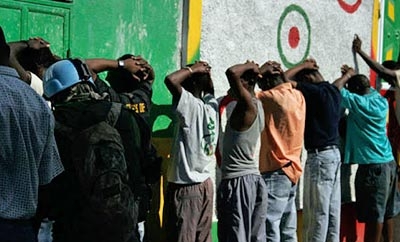Jamaica has passed controversial new anti-gang legislation, which opponents fear will criminalize broad sectors of vulnerable youth, and even supporters admit will be of little use unless politicians sever their gang ties.
After nearly two years of delays and fierce political debate, the Jamaican House of Representatives finally approved the Criminal Justice (Suppression of Criminal Organisations) Act with unanimous cross-party support. The bill will now be passed to the Senate on February 21.
The new legislation criminalizes a broad range of behavior linked to gangs, including gang membership, facilitating gang-related criminal activities, advising gangs, and recruiting for gangs.
The law also establishes new penalties for such gang activity, with most punishable by up to 20 years in prison if convicted in a Circuit Court.
One of the most contentious points of the bill, which would have criminalized gang tattoos and markings, dress, graffiti and songs promoting gang life, was removed in the final debates, reported the Jamaica Observer. However, supporters are pushing for a modified version of the section to be added to legislation already on the books.
InSight Crime Analysis
Jamaica is the most violent country in the Caribbean, and one of the most violent in the Americas. A large proportion of these murders are linked to gangs that not only control criminal activities but in many areas have effectively replaced the state as the principal authorities.
SEE ALSO: Coverage of the Caribbean
While tackling these gangs is a security priority for Jamaica, the history of such hardline legislation in other gang plagued countries around the region casts doubt on whether the approach will be effective.
In countries like El Salvador, tough legislation criminalizing gang membership and association has achieved little other than filling already overcrowded jails with youths, many of which never even stand trial. However, while in prison they are integrated further into gang life, cementing the influence of the gangs.
Studies by civil society groups have already highlighted the risk of something similar happening in Jamaica, where youths in deprived inner city areas almost inevitably have some level of contact with gangs and will be left vulnerable to criminalization.
The situation is further complicated by the political connections of gangs, which since Jamaica’s independence have been used by politicians to deliver votes and control areas. In the debate over the bill, even proponents of the legislation highlighted how these ties must be severed for any anti-gang action to prove successful.

